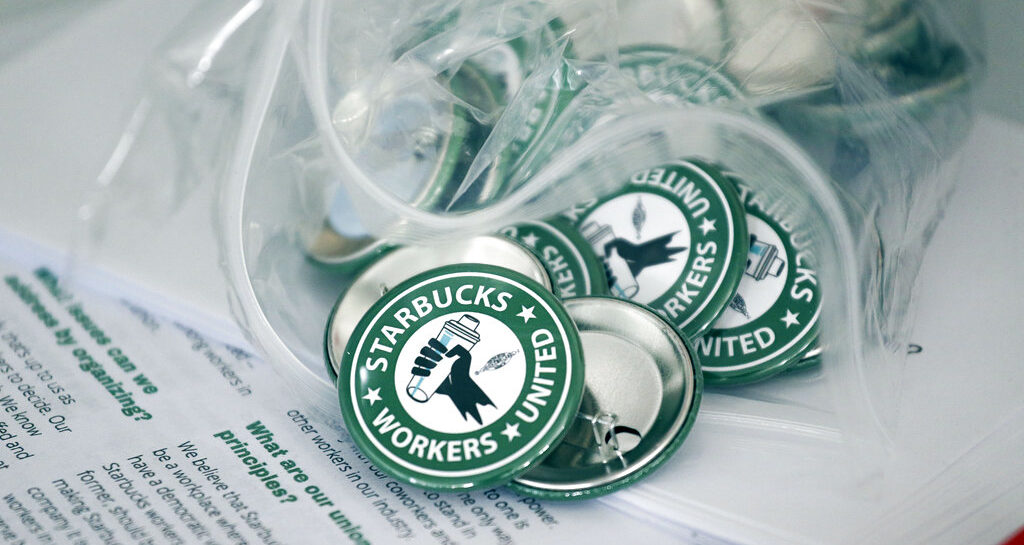[ad_1]
Starbucks is asking the National Labor Relations Board to temporarily suspend all union elections at its U.S. stores after a career employee with the labor board told the company of alleged improper coordination between regional NLRB officials and the union.
In a letter sent Monday to the NLRB, Starbucks said the employee informed the company about numerous issues in the NLRB’s St. Louis office while it was overseeing a union election at a Starbucks store in Overland Park, Kansas, earlier this spring.
The store is one of 314 U.S. Starbucks locations where workers have petitioned the NLRB to hold union elections since late last year. More than 220 of those Starbucks stores have voted to unionize. The company opposes the unionization effort.
The Seattle coffee giant alleges that St. Louis regional officials made special arrangements for pro-union workers to vote in person at its office when they didn’t receive mail-in ballots, even though Starbucks and the union had agreed that store elections would be handled by mail-in ballot.
Starbucks said regional officials also disclosed confidential information to the union, including which workers’ ballots had arrived in the mail to be counted.
Starbucks Workers United, the group seeking to unionize U.S. Starbucks stores, accused the company of trying to “distract attention away from their unprecedented anti-union campaign, including firing over 75 union leaders across the country, while simultaneously trying to halt all union elections.”
“Workers have spoken loud and clear by winning 82 percent of union elections,” the group said in a statement. “Ultimately, this is Starbucks’ latest attempt to manipulate the legal process for their own means and prevent workers from exercising their fundamental right to organize.”
NLRB Press Secretary Kayla Blado said Monday that the agency doesn’t comment on open cases.
“The agency has well-established processes to raise challenges regarding the handling of both election matters and unfair labor practice cases. Those challenges should be raised in filings specific to the particular matters in question,” Blado said in a statement.
Workers at the Overland Park store petitioned the NLRB to hold a vote in February. In April, workers voted 6-1 to unionize, but seven additional ballots were the subject of challenges from Starbucks or the union. A hearing on those challenges is scheduled for Tuesday; Starbucks has asked that hearing to be delayed.
Blado said the NLRB will “carefully and objectively” consider any challenges that Starbucks raises through “established channels.” Starbucks can also seek expedited review in the case, Blado said.
Starbucks said there is evidence of misconduct in other regions as well. The company wants the NLRB to thoroughly investigate other Starbucks union elections and make public a report on its findings. The company said the board should also implement safeguards to prevent regional officials from coordinating with one party or another.
Starbucks also asked the NLRB to issue an order requiring all pending and future elections to be conducted in person with observers from both sides.
“If the NLRB does not respond by investigating and remedying these types of actions, we do not see how the board can represent itself as a neutral agency,” the company said in the letter.
Starbucks isn’t the only large company facing a unionization effort that has attacked the voting process.
Amazon has also levied accusations of improper conduct against the NLRB’s regional office in Brooklyn in its attempt to re-do a historic labor win at a warehouse on Staten Island, New York. Among other things, Amazon said the agency tainted the voting process by seeking reinstatement of a fired Amazon worker in the weeks leading up to the March election.
Attorneys representing the e-commerce juggernaut argued their case in an agency hearing during the summer. Attorneys for the agency have pushed back. A regional director for an NLRB office in Phoenix is expected to issue a ruling on that case in the coming weeks.
[ad_2]
Image and article originally from libn.com. Read the original article here.

